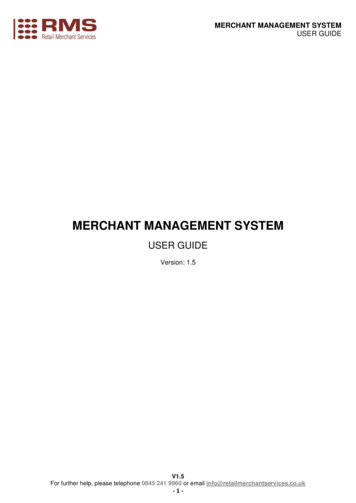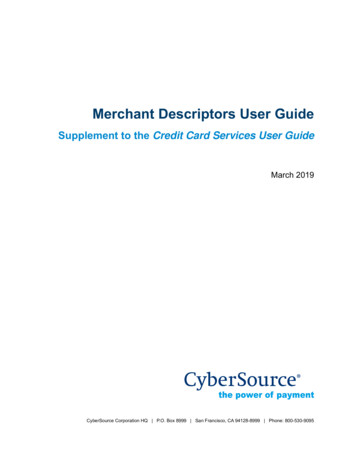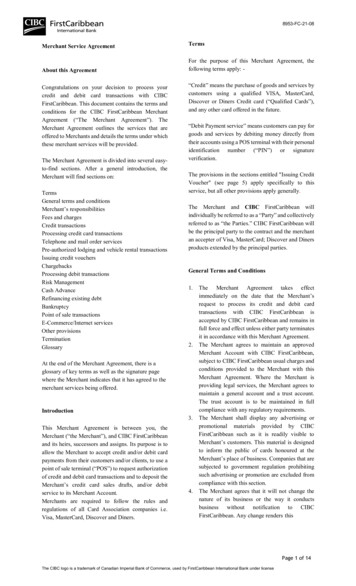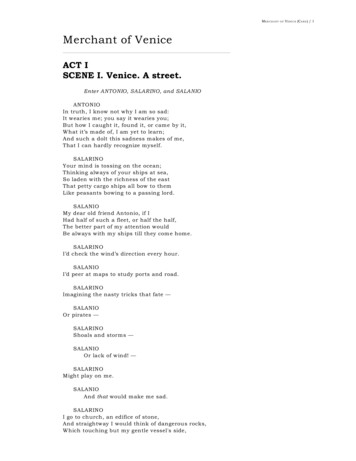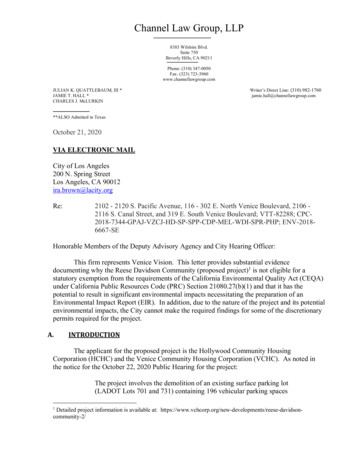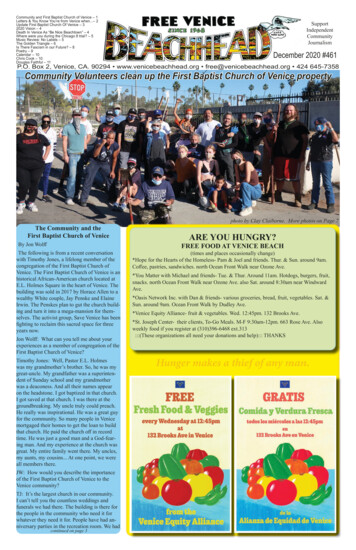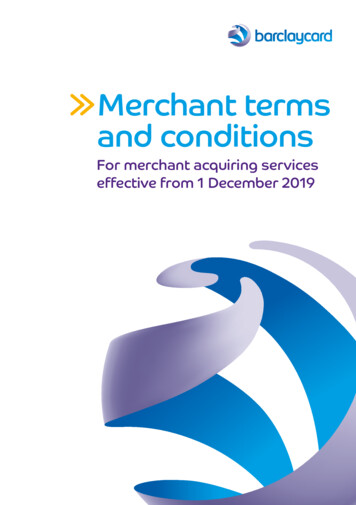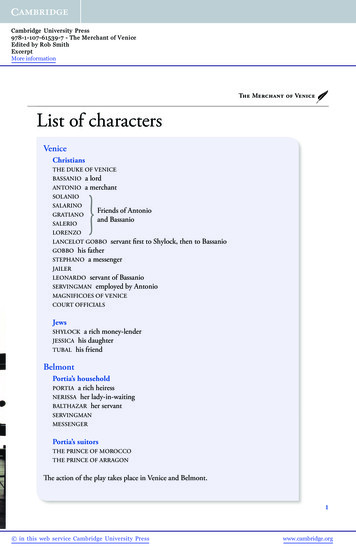
Transcription
Cambridge University Press978-1-107-61539-7 - The Merchant of VeniceEdited by Rob SmithExcerptMore informationTHE MERCHANT OF VENICEList of charactersVeniceChristiansTHE DUKE OF VENICEBASSANIOANTONIOa lorda merchantSOLANIOSALARINOGRATIANOSALERIOFriends of Antonioand BassanioLORENZOLANCELOT GOBBOGOBBOservant first to Shylock, then to Bassaniohis fathera messengerSTEPHANOJAILERservant of BassanioSERVINGMAN employed by AntonioLEONARDOMAGNIFICOES OF VENICECOURT OFFICIALSJewsa rich money-lenderJESSICA his daughterTUBAL his friendSHYLOCKBelmontPortia’s householdPORTIA a rich heiressNERISSA her lady-in-waitingBALTHAZAR her servantSERVINGMANMESSENGERPortia’s suitorsTHE PRINCE OF MOROCCOTHE PRINCE OF ARRAGONThe action of the play takes place in Venice and Belmont.1 in this web service Cambridge University Presswww.cambridge.org
Cambridge University Press978-1-107-61539-7 - The Merchant of VeniceEdited by Rob SmithExcerptMore informationAntonio says he does not know what causes his sadness. Salarino and Solanio suggest that he is worried about thesafety of his ships, in which he has invested so much money.sooth truthCharactersFocus on Antonio – why is he so sad?The opening line of the play quickly establishes that Antonio, theMerchant of Venice, is in a melancholy mood. He goes on to explainhow weary it makes him and how he is losing sight of who he really is.But he is also puzzled by why he is sad. As the first scene unfolds, compile a list of possible reasons forhis sadness. At the end of the scene, the whole class pools itsideas. Start a Character file on Antonio and write down what youfeel are the most interesting possibilities; amend and qualify themas the play unfolds. Link the points you make to quotations andother evidence from the script.to learn ignorantAnd myself sadness has mademe so absent-minded that I hardlyknow who I amargosies merchant shipsportly statelysignors gentlemenburghers important citizenspageants processionsDo traffickers look down onsmall boatsdo them reverenceshow them respectStagecraftWhere do they meet? Set the scene (in pairs)At the beginning of each scene a location is given (here it is simply‘Venice’). But in Shakespeare’s theatre the action took place on abare stage, with little or no scenery (see the illustration on p. 189).Since Shakespeare’s day, each director of a stage production has hadto make decisions about whether they will indicate precise locations.venture forth trade ships at seaThe better affectionsmost of my concernstill foreverPlucking wind throwing grassin the air to find the direction ofthe windPiring in looking closely atroads anchorages Try your hand at scene-setting. Decide on a suitable place inVenice for the three friends’ meeting. Perhaps they meet in ahouse or an office, or in a public place such as a bar, a café orthe Venetian Stock Exchange. Select your favourite suggestions. Then imagine that you are preparing to direct a performanceof The Merchant of Venice. Start your own Director’s Journal andwrite down your ideas under the heading ‘Scene-setting’. Useyour journal to record further ideas about stagecraft as you gothrough the play.2 in this web service Cambridge University Presswww.cambridge.org
Cambridge University Press978-1-107-61539-7 - The Merchant of VeniceEdited by Rob SmithExcerptMore informationThe Merchant of VeniceAct 1 Scene 1VeniceEnter ANTONIO, SALARINO, and SOLANIOANTONIOSALARINOSOLANIOIn sooth I know not why I am so sad.It wearies me, you say it wearies you;But how I caught it, found it, or came by it,What stuff ’tis made of, whereof it is born,I am to learn.And such a want-wit sadness makes of me,That I have much ado to know myself.Your mind is tossing on the ocean,There where your argosies with portly sailLike signors and rich burghers on the flood,Or as it were the pageants of the sea,Do overpeer the petty traffickersThat curtsey to them, do them reverence,As they fly by them with their woven wings.Believe me, sir, had I such venture forth,The better part of my affections wouldBe with my hopes abroad. I should be stillPlucking the grass to know where sits the wind,Piring in maps for ports, and piers, and roads;And every object that might make me fearMisfortune to my ventures, out of doubtWould make me sad.51015203 in this web service Cambridge University Presswww.cambridge.org
Cambridge University Press978-1-107-61539-7 - The Merchant of VeniceEdited by Rob SmithExcerptMore informationAntonio says he is not worried about business matters. He has invested his money in several ships. That is muchsafer than relying on only one. He’s not in love either!Write about itwind breathblow ague give me a feverDisasters at seaSalarino says that if he were in Antonio’s situation, everything hedid or saw would constantly remind him of all the disasters thatmight happen to his ships as they transported their valuable cargoesacross the ocean. Blowing his soup to cool it would make him think of the dangersof violent tempests (lines 22–4). Watching the sand pass through an hourglass would remind himof a beached ship (lines 25–8). Gazing at the stone walls of a church would make him imaginethem as rocks on which the vessel might founder (lines 29–36).Take each of these sections of the script in turn. Write advice for anactor about how to deliver the lines and about what gestures (or‘stage business’) to add as he speaks his words. Add this advice to anew section in your Director’s Journal.1 I’m not in love (by yourself )wealthy Andrew the San Andrés(St Andrew), a valuable Spanish shipcaptured by the English in 1596Vailing top bowing downher mainmastribs the timber frame of the hullholy stone the fontEnrobe silks dressing theraging sea with my cargo of silkbut even now a moment agobottom shipWhen Solanio implies that Antonio’s sadness is caused by being in love(line 46), Antonio is quick to deny it (‘Fie, fie!’). Experiment with different ways of delivering these two words in orderto bring out exactly how you think Antonio feels. For example, whatmight the brevity of his response suggest about his attitude to love –and to women? Show your favourite version to others in your class.2 Janus: facing two ways (in pairs)The play contains many references to figures from classical mythology. Here,Solanio alludes to Janus, a Roman god who faced in two opposite directionsat the same time. Solanio uses this reference to demonstrate his belief thatall humans have the capacity to be happy and sad simultaneously.a First, have a go at drawing an image of Janus. Then talk together aboutwhat your drawing suggests about the world of Venetian males thatShakespeare creates at the start of the play.b Summarise your thinking in one written sentence, ready to share withother pairs.Janus a Roman god who faced intwo opposite directionsframed madepeep eyes squint throughtheir eyes (because they have beennarrowed by laughing)laugh like parrots bagpiperlaugh inappropriately (i.e. parrotsmaking laughing noises when theyhear sad music)vinegar aspèct sour looksNestor a Greek king, famed forhis seriousness4 in this web service Cambridge University Presswww.cambridge.org
Cambridge University Press978-1-107-61539-7 - The Merchant of VeniceEdited by Rob SmithExcerptMore informationThe Merchant of Venice Act 1 Scene 1SALARINOANTONIOSOLANIOANTONIOSOLANIOMy wind cooling my brothWould blow me to an ague when I thoughtWhat harm a wind too great might do at sea.I should not see the sandy hourglass runBut I should think of shallows and of flats,And see my wealthy Andrew docked in sand,Vailing her high top lower than her ribsTo kiss her burial. Should I go to churchAnd see the holy edifice of stoneAnd not bethink me straight of dangerous rocks,Which touching but my gentle vessel’s sideWould scatter all her spices on the stream,Enrobe the roaring waters with my silks,And (in a word) but even now worth this,And now worth nothing? Shall I have the thoughtTo think on this, and shall I lack the thoughtThat such a thing bechanced would make me sad?But tell not me: I know AntonioIs sad to think upon his merchandise.Believe me, no. I thank my fortune for it,My ventures are not in one bottom trusted,Nor to one place; nor is my whole estateUpon the fortune of this present year:Therefore my merchandise makes me not sad.Why then, you are in love.Fie, fie!Not in love neither? Then let us say you are sadBecause you are not merry; and ’twere as easyFor you to laugh and leap, and say you are merryBecause you are not sad. Now by two-headed Janus,Nature hath framed strange fellows in her time:Some that will evermore peep through their eyes,And laugh like parrots at a bagpiper;And other of such vinegar aspèct,That they’ll not show their teeth in way of smileThough Nestor swear the jest be laughable.253035404550555 in this web service Cambridge University Presswww.cambridge.org
Cambridge University Press978-1-107-61539-7 - The Merchant of VeniceEdited by Rob SmithExcerptMore informationMore friends arrive. One of them, Gratiano, comments on how careworn Antonio has become. He recommendslaughter over misery and warns against false seriousness.1 True friends? (in fours)The entrance of Bassanio and two friends, Lorenzo and Gratiano, can beused to change the mood of the scene. There are now six men on stage,but Salarino and Solanio quickly decide to leave when the others arrive.What prompts their departure? Are there tensions between these twogroups of friends? Or do you think their departure is entirely natural? Take parts and read aloud lines 57–68. First, make the wordsfriendly and polite; then play them in a manner that suggests someunpleasantness and mistrust. Decide which version you think is moreeffective and show it to the other groups in the class for comment.Write about itprevented me beaten me to itYour regardyou’re a good friendembrace th’occasiontake the opportunitylaugh meet up and have some funstrange unfriendlyWe’ll yours our time is yoursThoughts about Antonio (in pairs)What have Solanio and Salarino made of Antonio’s behaviour inthe first part of the scene? Write their thoughts on taking theirleave of him as a scripted conversation between the two men.Use modern English.You world you care too muchabout what people thinkThemesThey lose care those whoAppearance and reality: all the world’s a stagetake life too seriously lose the abilityto enjoy itAntonio’s lines 77–9 echo well-known words from Act 2 Scene 7 ofShakespeare’s As You Like It:And groans I’d ratherAll the world’s a stage,And all the men and women merely players:They have their exits and their entrancesAnd one man in his time plays many partsAlthough Antonio views the part he currently has to play as ‘a sadone’, Gratiano makes it clear that he wants to ‘play the Fool’ (line 79).Both men acknowledge that they live in a world where false actionsand feelings are prominent. Gratiano’s long speech satirises (makesfun of) the ways in which many Elizabethan men pretend to be whatthey are not. Read lines 88–99 and write an explanation for a younger studentof exactly what Gratiano is saying. Add a paragraph discussingwhat the lines suggest about Gratiano’s character, his attitudesand his values.cheer myself up with drink thanweaken my heart with sighs andbeing miserableSit alabaster be like hisgrandfather’s statue in the cemeterycreep jaundice become avictim of diseasevisages facesDo cream and mantle becomestill and covered overdo a wilful wisdomremain stubbornly silent in orderto appear wiseOracle someone ofinfinite wisdomwhen bark let no inferiorperson dare interrupt me6 in this web service Cambridge University Presswww.cambridge.org
Cambridge University Press978-1-107-61539-7 - The Merchant of VeniceEdited by Rob SmithExcerptMore informationThe Merchant of Venice Act 1 Scene 1Enter BASSANIO, LORENZO, and ENZOBASSANIOGRATIANOANTONIOGRATIANOHere comes Bassanio, your most noble kinsman,Gratiano, and Lorenzo. Fare ye well;We leave you now with better company.I would have stayed till I had made you merry,If worthier friends had not prevented me.Your worth is very dear in my regard.I take it your own business calls on you,And you embrace th’occasion to depart.Good morrow, my good lords.Good signors both, when shall we laugh? Say, when?You grow exceeding strange; must it be so?We’ll make our leisures to attend on yours.Exeunt Salarino and SolanioMy Lord Bassanio, since you have found AntonioWe two will leave you, but at dinner timeI pray you have in mind where we must meet.I will not fail you.You look not well, Signor Antonio.You have too much respect upon the world:They lose it that do buy it with much care.Believe me, you are marvellously changed.I hold the world but as the world, Gratiano:A stage where every man must play a part,And mine a sad one.Let me play the Fool.With mirth and laughter let old wrinkles come,And let my liver rather heat with wineThan my heart cool with mortifying groans.Why should a man whose blood is warm withinSit like his grandsire cut in alabaster?Sleep when he wakes? And creep into the jaundiceBy being peevish? I tell thee what, Antonio –I love thee, and it is my love that speaks –There are a sort of men whose visagesDo cream and mantle like a standing pond,And do a wilful stillness entertain,With purpose to be dressed in an opinionOf wisdom, gravity, profound conceit,As who should say, ‘I am Sir Oracle,And when I ope my lips, let no dog bark!’606570758085907 in this web service Cambridge University Presswww.cambridge.org
Cambridge University Press978-1-107-61539-7 - The Merchant of VeniceEdited by Rob SmithExcerptMore informationGratiano advises Antonio against using sadness to gain a reputation for wisdom. Antonio asks Bassanio whom heloves. Bassanio begins by explaining his plans to pay off his debts.That therefore nothingwhose silence gains them areputation for wisdomdamn fools cause thoselistening to call them foolsfish opinion don’t use yoursadness as bait to catch this stupidfish called reputationexhortationstrongly offered advicemoe more Gratiano, Bassanio and Antonio pictured together in the opening scene.Identify each of the three characters and justify your decision by linkingit to evidence from the script. What do you make of the relationship betweenthe three Christians that is presented in this image? Write a couple ofsentences in response.gear advice (or business)neat’s tongue dried cured oxtongue (with a secondary meaningof ‘sexually impotent old man’)vendible desirableCharactersFirst impressions of Bassanio (in small groups)a Bassanio’s first words in the play are a mocking put-down of his‘friend’ Gratiano. Talk together about whether you think Gratianodeserves Bassanio’s scornful judgement. Why, or why not?b When he is invited by Antonio to speak about the ‘lady’ he’s inlove with, Bassanio answers by talking extensively about his debts.He has spent all his money and owes a great deal. One personreads aloud lines 121–33. The others echo every word that isconnected with money or financial transactions. Afterwards,talk together about: what the ‘echoing’ activity and the lines suggest aboutBassanio’s attitude to wealth your response to Bassanio’s lines suggesting that his ‘secretpilgrimage’ is simply a ploy to ‘get clear of all the debts I owe’.c On your own, write a few sentences giving your initial assessmentof Bassanio’s character. Display your evaluation of Bassanio on alarge sheet of paper and add to it as you read on.secret pilgrimage journey of lovedisabled mine estateoverspent my fortuneBy something continuanceby enjoying a standard of living Icould not affordNor rate I don’t complainabout having to economiseprodigal wastefulgaged owingfrom purposes because of ourfriendship I owe you an explanation8 in this web service Cambridge University Presswww.cambridge.org
Cambridge University Press978-1-107-61539-7 - The Merchant of VeniceEdited by Rob SmithExcerptMore informationThe Merchant of Venice Act 1 Scene NIOBASSANIOO my Antonio, I do know of theseThat therefore only are reputed wiseFor saying nothing; when I am very sureIf they should speak, would almost damn those earsWhich, hearing them, would call their brothers fools.I’ll tell thee more of this another time.But fish not with this melancholy baitFor this fool gudgeon, this opinion.Come, good Lorenzo. Fare ye well awhile;I’ll end my exhortation after dinner.Well, we will leave you then till dinner time.I must be one of these same dumb wise men,For Gratiano never lets me speak.Well, keep me company but two years moe,Thou shalt not know the sound of thine own tongue.Farewell; I’ll grow a talker for this gear.Thanks, i’faith, for silence is only commendableIn a neat’s tongue dried, and a maid not vendible.Exeunt [Gratiano and Lorenzo]It is that anything now.Gratiano speaks an infinite deal of nothing, more than anyman in all Venice. His reasons are as two grains of wheat hid in twobushels of chaff: you shall seek all day ere you find them, and whenyou have them they are not worth the search.Well, tell me now what lady is the sameTo whom you swore a secret pilgrimageThat you today promised to tell me of.’Tis not unknown to you, Antonio,How much I have disabled mine estateBy something showing a more swelling portThan my faint means would grant continuance.Nor do I now make moan to be abridgedFrom such a noble rate, but my chief careIs to come fairly off from the great debtsWherein my time, something too prodigal,Hath left me gaged. To you, Antonio,I owe the most in money and in love,And from your love I have a warrantyTo unburden all my plots and purposesHow to get clear of all the debts I owe.951001051101151201251309 in this web service Cambridge University Presswww.cambridge.org
Cambridge University Press978-1-107-61539-7 - The Merchant of VeniceEdited by Rob SmithExcerptMore informationAntonio is ready to help Bassanio, whatever the circumstances. Bassanio explains that he wishes to marry Portia,a wealthy heiress. Rich and famous men from all over the world come to woo her.1 Antonio: reckless devotion? (in pairs)In lines 134–8, Antonio offers to do everything in his power to help hisfriend Bassanio.a Take it in turns to read the lines aloud. Then discuss whether Antoniois being foolish in offering to bail out his friend again, after the wayBassanio has wasted Antonio’s money before. Does Bassanio’s honestadmission that he has behaved like a ‘wilful youth’ really excuse hisprevious mistakes?b One of you is Antonio, the other a friend he goes to for advice.Improvise a conversation in which you discuss Bassanio’s situationand his requests for further credit.And if honour and if it’shonourable, as you areMy purse occasionseverything I have is at your disposalshaft arrowhis fellow flightan identical arrowadvisèd carefulproof experiencelike a wilful lost like a stupidboy, I’ve lost every penny I’veborrowed from youCharactersFirst impressions of Portia (in small groups, then by yourself )In lines 160–71, the audience first hears of Portia. Bassanio usesstories of ancient Greece and Rome to praise her. He comparesher (line 165) to Portia, the daughter of Cato, a famous Romanpolitician, and the wife of Brutus, the ‘honourable man’ who wasone of Julius Caesar’s assassins. Bassanio also sees her as a rich prize(see ‘Characters’, p. 177, on the position of women in Elizabethansociety), like the Golden Fleece the Greek hero Jason sought inColchis (see ‘The language of The Merchant of Venice’, p. 181). Thesereferences suggest that Bassanio is an educated man and that Portiais a lady of high social status.a Read aloud lines 160–71. Each person reads up to a punctuationmark, then hands on to the next. Emphasise all the words andphrases Bassanio uses to praise Portia.hazard riskTo wind circumstanceto make use of my love for you in aroundabout wayIn uttermost by doubting mylimitless helpprest unto forced intoa lady richly left a rich heiressb Working on your own: Use Bassanio’s description to write a paragraph giving yourown impressions of Portia. Include a comment about theimpact of Bassanio’s use of classical references in describing her. Suggest at least two possible reasons why Shakespeare choseto have Bassanio begin the description of Portia by explainingthat she is ‘a lady richly left’. Finally, write a sentence explaining why you think Shakespearehas Bassanio describe Portia at this point, even though she isnot introduced into the play until the following scene.Renownèd suitors famous menwho want to marry her10 in this web service Cambridge University Presswww.cambridge.org
Janus a Roman god who faced in two opposite directions framed made peep eyes squint through their eyes (because they have been narrowed by laughing) laugh like parrots bagpiper laugh inappropriately (i.e. parrots making laughing noises when they hear sad music) vinegar aspèct sour looks Nestor a Greek king, famed for his seriousness .



